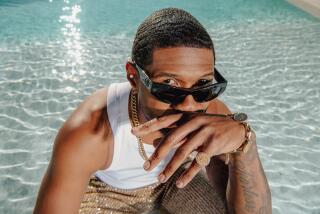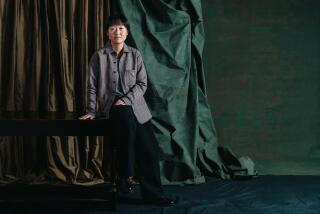What’s it like inside a teen pop star’s head? Ask Teddy Wayne.
What signifies fame 2013-style more than a teen pop megastar with a momager? In his new novel, “The Love Song of Jonny Valentine” (Free Press, $25), author Teddy Wayne takes a look into the heart of celebrity through the perspective of an 11-year-old singer.
“Love Song” follows young Jonny as he faces the manic highs and the claustrophobic lows of pop stardom. Jonny thinks and speaks in a language comprised of tween naivete and marketing lingo picked up from an industry to which he is bound.
Wayne, who won a Whiting Writers’ Award for his 2010 debut novel “Kapitoil,” chatted by email about getting inside the head of an 11-year-old, his character’s passing resemblance to Justin Bieber and our culture’s endless fascination with celebrity.
On Wednesday, Wayne will be reading and signing at Skylight Books at 7:30 p.m., and then on Valentine’s Day, he’s participating in a Literary Death Match at Busby’s East.
What was it like writing in the voice of an 11-year-old boy? How did you go about establishing a voice for Jonny?
My own arrested development, sadly, facilitated getting into the head of an 11-year-old. In my defense, the earliest pages did smack too much of an adult straining to replicate the voice of a preadolescent, so I had to temper it.
For about two years, on and off, I wrote a weekly New York Times business column about the media and marketing. I’d interview people in the field who invariably sprinkled their speech with the 21st-century terms of their industry — “the digital space,” “building our brand,” etc. I thought it would be interesting to write in the voice of someone who had so deeply internalized this jargon that it infected his thought patterns. But rather than make the narrator an adult, I felt that the opposite of a predatory marketer who wants to sell you something you don’t need is a naïve child who wants only your love. The key to Jonny’s voice was merging this cynical patois with the innocent, run-on grammar and emotional comprehension of a sixth-grader.
What spurred your interest in writing on fame and pop stardom?
When my first novel, “Kapitoil,” came out in 2010, I went through what I imagine every writer (and every person who puts out something personal) goes through: the intense vulnerability of seeing your heretofore private thoughts and work made public. It was certainly gratifying, but there were times — negative or nonexistent reviews, poorly attended readings — that it was more distressing than enjoyable. If I got this distraught over a bad Amazon review that no one would see, I wondered how celebrities handle the much broader and snarkier scrutiny. And if I had this much trouble as an adult, how would a young celebrity cope?
But it goes beyond real celebrities; as a culture, we’re all turning into entrepreneurial narcissists, publicizing our private lives on Facebook and constantly self-promoting (just like I’m doing in this interview!). Celebrities fend off paparazzi while they vacation; we paparazzi our own vacations by posting photos on Instagram for everyone to see.
Why do you think Americans have such a great obsession with fame, celebrities and stardom?
In the absence of believing in the Olympian gods or other deities, we need to feel that there are some humans out there who seem superhuman. So we deify them, worshipping their preternatural talent (and, usually, good looks) as a means of redeeming the rest of the human project. When you’re staring at Brad Pitt and Angelina Jolie on the red carpet, it’s easy to forget that 46 million Americans live below the poverty line or that 36% of us are obese. (To their credit, they’re two celebrities who use their fame for numerous causes.)
What type of research did you do in order to create an accurate representation of the music industry?
I’m an avid music fan, so some of it I knew already, and as a working journalist in New York, I’ve had some exposure to how the media and arts operate behind the scenes. But I read articles and essays on the music industry whenever possible — John Seabrook at the New Yorker has had several engaging ones recently on music marketing — as well as books about musicians. Margo Jefferson’s book, “On Michael Jackson,” and John Jeremiah Sullivan’s essay on him were both valuable; an academic text, “The Cultural Significance of the Child Star” by Jane O’Connor, was my most useful resource; and even various pop-star autobiographies (Miley Cyrus’s “Miles To Go”, Justin Bieber’s “First Step 2 Forever: My Story”) and tabloids were necessary.
I will say that, as a thirty-something man, you attract a lot of unwanted attention in Barnes & Noble when you’re leafing through a stack of issues of Tiger Beat.
Did you listen to an obscene amount of pop music while writing the novel and what song could you just not get out of your head? (My guess is something Taylor Swift-ish?)
I did listen to a lot, to get a feel for the songs but also for the packaging of them in videos. Teen pop stars often try to show how relatable and normal they are, hence Miley Cyrus’ “Party in the U.S.A.,” in which she’s depicted as a rube from Nashville who’s out of her element in L.A. (despite her father’s own musical fame). I find that song quite catchy, as well as One Direction’s “What Makes You Beautiful,” which also has unintentional irony: What makes the girl beautiful is not who she is inside — give the songwriters credit for avoiding that cliché — but the fact that she simply doesn’t know that she’s the most beautiful girl in the room. So, she probably would’ve been beautiful either way. I listened to that one a lot.
Both your first novel and “The Love Song of Jonny Valentine” are written in the first person. What are the pleasures and the challenges of writing in the first person?
I’m drawn to ventriloquism, both in fiction and in my humor writing for magazines and newspapers. Getting into the voice of someone who sounds completely unlike me gives me access to their character I wouldn’t find in the third person — and, ultimately, it lets me express ideas and sentiments that are most important to me.
The challenges of first person, especially the idiosyncratic first person that I’ve employed for these two novels, are that you don’t want the voice to seem gimmicky, and it can be limiting. If the voice can just as easily be transcribed to third person, it probably should be in the third person, which affords more latitude to the author. But I also think that we live in an era of televisual and cinematic primacy, and those media have third-person points of view. To justify a story told in words, it must make ecstatic use of those words, and provide interiority that TV and film can’t. For those reasons, I’m most interested in first-person narrators who are linguistically askew.
There has been speculation that your main character is based on Justin Bieber. Is there any truth to that?
The Simon & Schuster legal team has determined that any resemblance to real persons living or dead in my novel is purely coincidental. And there is definitely not a lawyer leaning over my shoulder, carefully monitoring me, as I convey this statement. And his name is not Jonathan F. Klein, Esq., and he absolutely didn’t eat something garlicky for lunch.
Is there any of your own preadolescent self in Jonny?
Probably some, but I relate more to Jonny now on a professional level. “Jonny” sounds like “Teddy,” and “Valentine” sounds like “Wayne” (that parallel only occurred to me after I finished the book). It’s his second album; it’s my second novel. He’s touring across America to play dozens of corporate arenas for thousands of fans; I’m about to embark on a book tour through five cities at independent bookstores with three people in attendance. He stays in luxury hotel suites and I’ll be crashing on friends’ couches .… Maybe I don’t relate to him, after all.
The novel has elements of dark irony, humor and sadness and through it all is a coming-of-age story. How did you strike a balance between all these elements?
I’m always seeking to capture the intersection of comedy and melancholy. To me, they’re flip sides of the same coin; one is usually the absence of the other, but sometimes, when you’re lucky, they can be conflated. It might be easier in a coming-of-age story. Not only does growing up provide so many potentially comic episodes — especially in the sexual realm — but there’s something inherently sad about leaving behind childhood.
ALSO:
Q&A;: Eddie Huang on his memoir, ‘Fresh Off the Boat’
Jim Crace plants unsettling seed of progress in ‘Harvest’
Google + hangout: George Saunders on ‘The Tenth of December’
More to Read
Sign up for our Book Club newsletter
Get the latest news, events and more from the Los Angeles Times Book Club, and help us get L.A. reading and talking.
You may occasionally receive promotional content from the Los Angeles Times.






